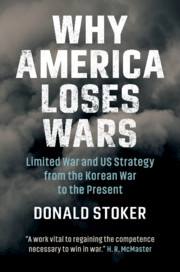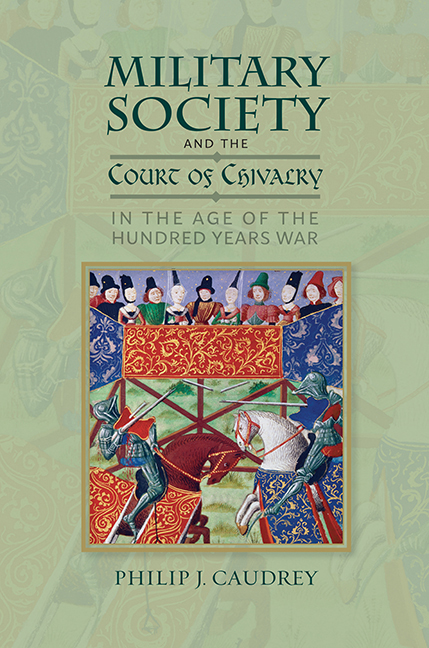Refine search
Actions for selected content:
15418 results in Military history
1 - Are We at War? What Do We Want? And Do We Want to Win?
-
- Book:
- Why America Loses Wars
- Published online:
- 09 August 2019
- Print publication:
- 29 August 2019, pp 1-19
-
- Chapter
-
- You have access
- HTML
- Export citation
4 - Constraints: Or Why Wars for Limited Aims are So Difficult
-
- Book:
- Why America Loses Wars
- Published online:
- 09 August 2019
- Print publication:
- 29 August 2019, pp 81-120
-
- Chapter
- Export citation
6 - And You Thought the War Was Hard: Ending the War and Securing the Peace
-
- Book:
- Why America Loses Wars
- Published online:
- 09 August 2019
- Print publication:
- 29 August 2019, pp 172-220
-
- Chapter
- Export citation
Notes
-
- Book:
- Why America Loses Wars
- Published online:
- 09 August 2019
- Print publication:
- 29 August 2019, pp 234-268
-
- Chapter
- Export citation

Why America Loses Wars
- Limited War and US Strategy from the Korean War to the Present
-
- Published online:
- 09 August 2019
- Print publication:
- 29 August 2019

Military Society and the Court of Chivalry in the Age of the Hundred Years War
-
- Published by:
- Boydell & Brewer
- Published online:
- 21 June 2019
- Print publication:
- 18 January 2019
Chapter 6 - The Persian Conquest of Egypt
-
- Book:
- Greek Military Service in the Ancient Near East, 401–330 BCE
- Published online:
- 10 June 2019
- Print publication:
- 20 June 2019, pp 148-175
-
- Chapter
- Export citation
Chapter 5 - The Revolt of Artabazus
-
- Book:
- Greek Military Service in the Ancient Near East, 401–330 BCE
- Published online:
- 10 June 2019
- Print publication:
- 20 June 2019, pp 119-147
-
- Chapter
- Export citation
Timeline
-
- Book:
- Greek Military Service in the Ancient Near East, 401–330 BCE
- Published online:
- 10 June 2019
- Print publication:
- 20 June 2019, pp xvii-xx
-
- Chapter
- Export citation
References
-
- Book:
- Greek Military Service in the Ancient Near East, 401–330 BCE
- Published online:
- 10 June 2019
- Print publication:
- 20 June 2019, pp 236-257
-
- Chapter
- Export citation
Chapter 3 - Greece and the Rebellion of Cyrus the Younger
-
- Book:
- Greek Military Service in the Ancient Near East, 401–330 BCE
- Published online:
- 10 June 2019
- Print publication:
- 20 June 2019, pp 64-87
-
- Chapter
- Export citation
Maps
-
- Book:
- Greek Military Service in the Ancient Near East, 401–330 BCE
- Published online:
- 10 June 2019
- Print publication:
- 20 June 2019, pp x-x
-
- Chapter
- Export citation
Acknowledgments
-
- Book:
- Greek Military Service in the Ancient Near East, 401–330 BCE
- Published online:
- 10 June 2019
- Print publication:
- 20 June 2019, pp xv-xvi
-
- Chapter
- Export citation
Dedication
-
- Book:
- Greek Military Service in the Ancient Near East, 401–330 BCE
- Published online:
- 10 June 2019
- Print publication:
- 20 June 2019, pp v-vi
-
- Chapter
- Export citation
Figures
-
- Book:
- Greek Military Service in the Ancient Near East, 401–330 BCE
- Published online:
- 10 June 2019
- Print publication:
- 20 June 2019, pp ix-ix
-
- Chapter
- Export citation
Chapter 2 - The Battle of Cunaxa
-
- Book:
- Greek Military Service in the Ancient Near East, 401–330 BCE
- Published online:
- 10 June 2019
- Print publication:
- 20 June 2019, pp 30-63
-
- Chapter
- Export citation
Preface
-
- Book:
- Greek Military Service in the Ancient Near East, 401–330 BCE
- Published online:
- 10 June 2019
- Print publication:
- 20 June 2019, pp xiii-xiv
-
- Chapter
- Export citation
Copyright page
-
- Book:
- Greek Military Service in the Ancient Near East, 401–330 BCE
- Published online:
- 10 June 2019
- Print publication:
- 20 June 2019, pp iv-iv
-
- Chapter
- Export citation
Chapter 8 - The Fall of the Achaemenid Persian Empire
-
- Book:
- Greek Military Service in the Ancient Near East, 401–330 BCE
- Published online:
- 10 June 2019
- Print publication:
- 20 June 2019, pp 207-230
-
- Chapter
- Export citation
Conclusion: The Other Persian Wars
-
- Book:
- Greek Military Service in the Ancient Near East, 401–330 BCE
- Published online:
- 10 June 2019
- Print publication:
- 20 June 2019, pp 231-235
-
- Chapter
- Export citation
